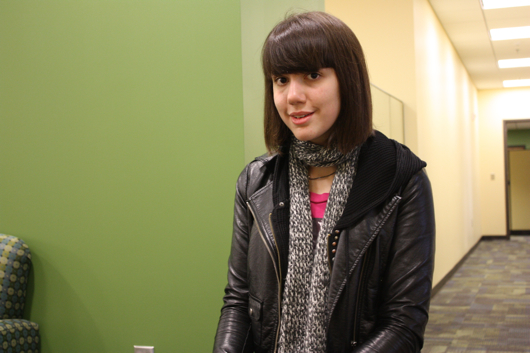Mason's fourth Truman Scholar aims towards environmental issues, Foreign Service

Junior Alexandra Tyson spoke with us about her recently awarded Truman Scholarship. (Jordan Frasier)
Mason may not have done as well in the NCAA Men's Basketball Tournament as some may have hoped, but according to one academic, the university still had something to celebrate this March. The achievement of one ambitious Mason student, she says, is on the same level as a Final Four run, at least in terms of academics.
Alexandra Tyson, a junior government and international politics major, was in “complete shock” when she learned she was a recipient of the prestigious Truman Scholarship in March. Tyson is only the fourth student from Mason ever to be awarded the scholarship.
“I knew [Tyson] was a very special student when I met her,” said LaNitra Berger the Director of Fellowships and the Undergraduate Apprenticeship Program at Mason. Berger spent a large sum of hours working with Tyson on her application and helping her practice for the scholarship interviews. From their training Berger knew Tyson’s “potential was limitless.”
According to Berger, the honor of winning the Truman Scholarship is “like winning the Final Four” on an academic front.
This year’s list of recipients includes winners from Harvard University, Yale and Princeton. The goal of the scholarship is to find and recognize college juniors with exceptional leadership potential who are committed to careers in government, the nonprofit or advocacy sectors, education or elsewhere in the public service field.
Tyson has worked with a variety of organizations at Mason but one initiative that she has spent a lot of time on is the Patriot Green Fund. As a member of the Environmental Action Group (EAG) and someone who has worked for the Office of Sustainability at Mason, Tyson helped start the process to create the fund in 2009.
The proposed fund is an idea that Tyson modeled off a few other universities. To support the fund, a five dollar fee would be added to a student’s tuition.
Fifty percent of the money would be invested in the bank to gain interest over time, another 40 percent would go towards capital projects or green initiatives at Mason, and the other 10 percent would go towards student research for green projects. Some of the green initiatives could be replacing incandescent light bulbs with compact fluorescent bulbs or adding solar panels to buildings at Mason.
While the fund has not yet been implemented at Mason, Tyson said they have received 2,000 signatures in support of the fund. She is “hopeful” that the Board of Visitors will support the fund at their meeting in May.
Tyson, who was born in England, then moved to Kuwait, and eventually the United States when she was seven, said she is now “itching to get out of the States.”
Her father, who is a diplomat, was part of her inspiration to one day work in the public service field.
“All I wanted to be was a foreign service officer,” Tyson said.
A Foreign Service officer serves as a diplomat for the State Department in different countries around the world. Tyson hopes she can travel to countries around the world and help them with environmental issues while also advancing U.S. Foreign Service policy.
In January 2010 Haiti was devastated from a massive 7.0 earthquake which shook the country. As a result of the earthquake Tyson said around 88 percent of the universities were leveled or destroyed and thousands of college students and faculty were killed.
With this destruction Tyson said there was a loss of knowledge, and a need to “train the next generation.”
As part of the application for the Truman Scholarship, Tyson formed a proposal that recommended a partnership between Virginia universities and the University of Haiti.
Tyson wants to combine the resources of the two country’s universities and send Virginia engineers, architects, and agricultural professors to the University of Haiti. These professors, said Tyson, can apply what they know to help rebuild Haiti.
“American students could also potentially come and work in the field,” Tyson said.
The goal would be for American professors to encourage and restore educational aid and implement architecture and engineering plans in an environmental sustainable way. As a result, Haitian faculty can work together, take ownership of the program, and eventually implement what they have learned when the initial program has finished.
While Tyson’s plan was only a proposal and she would like to implement it, she knows that may be a little difficult to accomplish now.
“I hope to do it in [my] career,” said Tyson. “[I] only just turned 21.”
As a recipient of the scholarship, Tyson will receive $30,000 for graduate programs in public service fields and the foundation will also provide assistance with career counseling, internship placement, graduate school admission, and professional placement.
According to Berger, however, the scholarship isn’t about the money but rather the prestige of the award.
“[These] students are generally not seeking recognition,” Berger said. The Truman Scholarship is a prestigious award based on the beliefs of President Truman, who constantly pushed for people to get involved in public service.
“[It’s] great to get scholarship money but even better to be named one of the top potential public servants,” said Berger about Tyson.
While Tyson is proud of her major accomplishment, she says she can’t let it go to her head.
“I want to live up to the reputation of a Truman scholarship,” Tyson said. “[I’m] so proud to represent Mason, [I] wouldn’t want to be at any other institution.”
